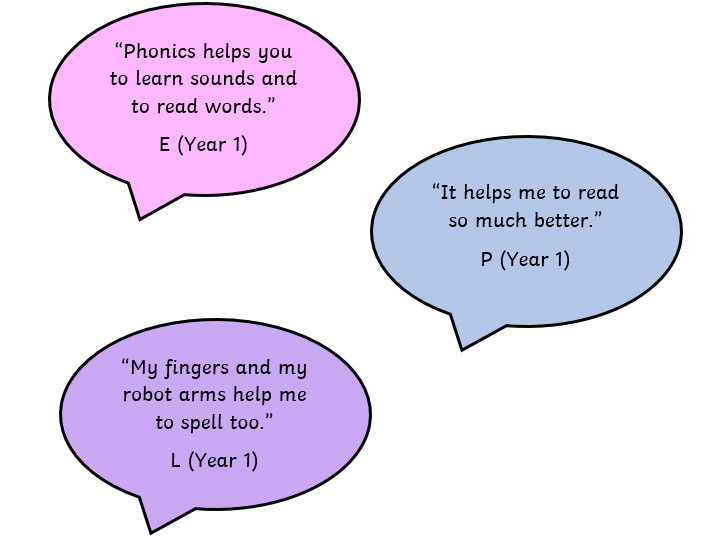Phonics
Intent
At Idle C of E Primary School, we recognise reading to be an essential life skill, and are committed to the development of early reading and phonics. We are keen for children to develop their reading skills as early as possible and promote a love of reading.
Implementation
We are keen for children to develop essential, early reading skills as soon as possible. Daily phonics sessions begin in Reception and continue into Key Stage One, providing children with strong foundations and rich opportunities to develop their reading skills. At Idle C of E Primary School, we follow the Essential Letter and Sounds (ELS) programme, ensuring that all children access high-quality, systematic phonics teaching. As part of each session, children will have the opportunity to engage with auditory and oral practice, as well as some physical development. Children will learn a series of Grapheme/ Phoneme Correspondences (GPC) and be supported to develop their segmenting and blending skills. Lessons are carefully planned and broken into four stages, ensuring that children have opportunity to review previous teaching, learn and then practice the new GPC, before applying what they have learnt to a short task. Throughout each session, children will have ample opportunity to listen and respond, engage in oral practice as well as develop their reading and spelling skills.
At the end of each week, children will receive a decodable reading book, closely matched to their current ability. Children are encouraged to read these four times to build fluency and confidence, in line with the school’s reading policy. Children will also receive weekly spellings which will be reflective of the GPCs taught that week. As part of their weekly spellings, each child will receive a copy of the GPC’s, corresponding pictures and rhymes taught. Parents are encouraged to review these with their children as part of their weekly homework.
Progression in phonics is closely monitored by the class teacher and the phonics leadership team. Children are regularly assessed and any gaps in their knowledge will be highlighted and additional support given. This enables children to keep up with the pace at which phonics is taught.
We are consistent in our approach to teaching early reading and phonics. Children will be introduced to and become familiar with a series of resources which can be used to support reading and spelling. These are often used in Reception and Year 1, but are also available for pupils throughout school.
Impact
Children will develop sufficient early reading and phonemic awareness, enabling them to become confident and successful readers. Children will develop a love for reading and begin to access a wider variety of texts appropriate to their age and development.
Teachers and leaders have clear expectations of the progress which children should be making. This is monitored each half-term to ensure that children are on track to meet the end of year expectations outlined below.
By the end of Reception, children will recognise, read and spell words containing Phase 2 and Phase 3 graphemes. Children will be developing their confidence in writing simple phrases and sentences, using their understanding and knowledge of phonics to support them. Children will also be familiar with a variety of ‘harder to read and spell words’ taught throughout Phases 2, 3 and 4.
By the end of Year 1, children will recognise read and spell words containing phonemes and graphemes taught as part of Phase 2, 3, 4 and 5. They will have developed confidence reading and spelling ‘harder to read and spell words’ reviewed and taught as part of Phase 5. Children will increasingly apply their phonemic awareness to both spelling and reading, developing fluency and confidence as they do so.
By the end of Key Stage 1, children will be able to apply their understanding of Phase 2, 3, 4, 5 and 6 phonemes and graphemes when reading and writing. Children will have developed greater awareness of spelling rules and patterns, which will begin to reflect in their wider writing. Children will have developed reading fluency and confidently access a variety of texts.

Resources for parents
In Reception and Year 1, children will learn new sounds and graphemes each day. Children will learn a total of 44 sounds and the ways they can be written (using single or multiple letters). The video linked below demonstrates how all 44 sounds should be pronounced.
Click the documents below to view the sounds children will learn, as well as the pictures and rhymes taught alongside them.
Further information and resources relating to the ELS phonics programme can be found on the Oxford Owl website.
Essential Letters and Sounds - Oxford Owl
Supporting your child with Phonics and Reading presentation from Phonics leader Miss Booth.
